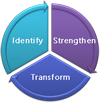What are the right tools for cognitive-developmental therapy for children and adults to remember, connect, and communicate? This is a question we address daily at Equipping Minds.
Many children and adults have tried tutoring, medication, speech therapy, occupational therapy, and vision therapy. However, they typically have done these in isolation and were only seen twice a week for 30-60 minutes. While there has been some improvement, we have seen that the combination of “cross-training” the brain in many areas five to seven days a week for 30 minutes to an hour a day over three to four months allows the neuropathways to connect.
Physical, cognitive, behavioral, and relational skills develop together rather than in isolation. Providing a more holistic approach to building challenge areas and enhancing strengths increases confidence, communication, memory, comprehension, processing, and relational skills. Treating the whole person through a multidisciplinary approach will give the best results. Please feel free to contact us for more details about our approach.
Equipping Minds
What makes Equipping Minds Cognitive Therapy holistic?
Equipping Minds Cognitive Therapy Exercises: One-on-One cognitive therapy, using Dr. Carol Brown’s Equipping Minds Cognitive Development Workbook. Cognitive therapy is a fully integrated system of drills and training exercises delivered in an intense, one-on-one environment designed to attack and rapidly correct weak or underdeveloped cognitive learning skills. It is not designed to tutor or teach academic subjects. Instead, it will develop the skills required to learn effectively. Cognitive skills-auditory processing, visual processing, working and long-term memory, comprehension, logic and reasoning, and attention skills – are foundational to a person’s ability to receive, process, and retain information. The program strengthens these skills allowing one to learn efficiently.
Cognitive therapy is a form of cognitive, educational therapy that helps to develop new and repair broken neurotransmitters. Each piece of the program is essential to the strengthening of working memory, processing speed, visualization, and auditory deficits; therefore, each exercise (eye, primitive reflex, and sound) is vital to the success of the student. You must set aside time each day for the program. This includes weekends. This program is designed for five one-hour therapy sessions per week in concurrence with the programs listed below implemented at home. Most individuals will complete the program in 12-24 weeks. The Cognitive Therapy program is holistic. Participation in the entire program is imperative. Partial participation will yield partial results.
Daily Schedule:
- 30-60 minute Equipping Minds cognitive therapy session five days a week (30-minute sessions may be recommended for younger children). In addition to the cognitive therapy session, the following should be completed at home:
- 10 mins EyeCanLearn if needed
- 15-minute primitive reflex exercises for 45 days with Maintaining Brains Everyday
- 1 hour Sound Therapy – you may turn the sound down so that you can hear it. Wear while doing the cognitive exercises. This is a passive exercise. Engage in conversation, work, or sleep. Sound Therapy is just as effective sleeping as it is if you concentrate on the music/stories. It is a passive therapy.
- Meclizine for vestibular therapy if needed. Please consult Dr. Brown on the recommended dosage. Recommend Rugby brand 12.5 meclizine from Amazon. Begin with 6mg in the morning and 6mg in the afternoon.
* Most of the information provided on this page is from the Equipping Minds Workbook, Cognitive Development Curriculum, Brown (2015)
Additional Research-Based Programs
Sensory-Motor Development Tools
- Eye Can Learn
- Sound Therapy
Neuro-development Programs
††Disclaimer: Equipping Minds is NOT Lindamood-Bell Learning Processes nor is it affiliated with, certified, endorsed, licensed, monitored or sponsored by Lindamood-Bell, Nanci Bell, Phyllis Lindamood, or Pat Lindamood. Lindamood-Bell – an international organization creating and implementing unique instructional methods and programs for quality intervention to advance language and literacy skills in no way endorses or monitors the services provided by Equipping Minds.
